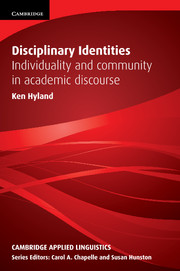Book contents
- Frontmatter
- Contents
- Series editors’ preface
- Preface
- Acknowledgements
- Notes on corpora and abbreviations
- 1 Identity: Interaction and community
- 2 Discipline: Proximity and positioning
- 3 Investigating identity
- 4 Identity in representational genres
- 5 Self-representation in academic bios
- 6 Culture: Authority and visibility
- 7 Reputation: Individuality and conformity
- 8 Gender: Disciplinarity and positioning
- 9 Identity, disciplinarity and methodology
- Appendix: Items with potential metadiscourse functions
- References
- Name Index
- Subject Index
8 - Gender: Disciplinarity and positioning
Published online by Cambridge University Press: 09 February 2023
- Frontmatter
- Contents
- Series editors’ preface
- Preface
- Acknowledgements
- Notes on corpora and abbreviations
- 1 Identity: Interaction and community
- 2 Discipline: Proximity and positioning
- 3 Investigating identity
- 4 Identity in representational genres
- 5 Self-representation in academic bios
- 6 Culture: Authority and visibility
- 7 Reputation: Individuality and conformity
- 8 Gender: Disciplinarity and positioning
- 9 Identity, disciplinarity and methodology
- Appendix: Items with potential metadiscourse functions
- References
- Name Index
- Subject Index
Summary
While current conceptions of identity stress the fluidity, complexity and context-sensitivity of identities, there are consistent patterns of experience in our biographies which influence how we interpret the here and now and so impact on the ways we perform identity work. As I have argued, building a sense of self means drawing on linguistic resources and discursive strategies to construct social categories about one’s self and others, categorisations that involve ideas of both similarity and difference. Perhaps one of the more obvious aspects of similarity and difference between people is the fact that they have bodies. We see the world from an embodied point of view, so our awareness of our sex is one of our earliest experiences and provides an important element of our sense of continuity. Part of this awareness is how we actually practise being men or women. Because the self is an enactment and not merely an embodiment, gender is likely to be one of the most salient aspects of personal experience that a writer brings to a text.
Like identity itself, gender is a verb rather than a noun (Butler, 1990), and we might expect this enactment to influence how individuals engage with community conventions to construct an authorial identity. Surprisingly, however, this has been relatively little studied in published academic writing. In this chapter I address this gap by examining how male and female reviewers perform a disciplinarily appropriate identity in academic book reviews. This genre offers an excellent site for the study of gender in academic writing as it virtually obliges authors to stake out positions: to take a stance towards ideas and readers. Here then, is an explicitly personal and public engagement with another’s work in a tightly argued space. Focusing on two diverse fields and considering both inter-gender and intra-gender language choices in the management of interactions, I explore what these stances reveal about identity construction.
Gender, identity and interaction
In an important sense, gender might be understood as a primary identity (Jenkins, 2008), which through socialisation in the family during infancy and beyond helps to organise our experiences and becomes integrated into our conceptions of selfhood (Berger and Luckman, 1967).
- Type
- Chapter
- Information
- Disciplinary IdentitiesIndividuality and Community in Academic Discourse, pp. 170 - 194Publisher: Cambridge University PressPrint publication year: 2012



